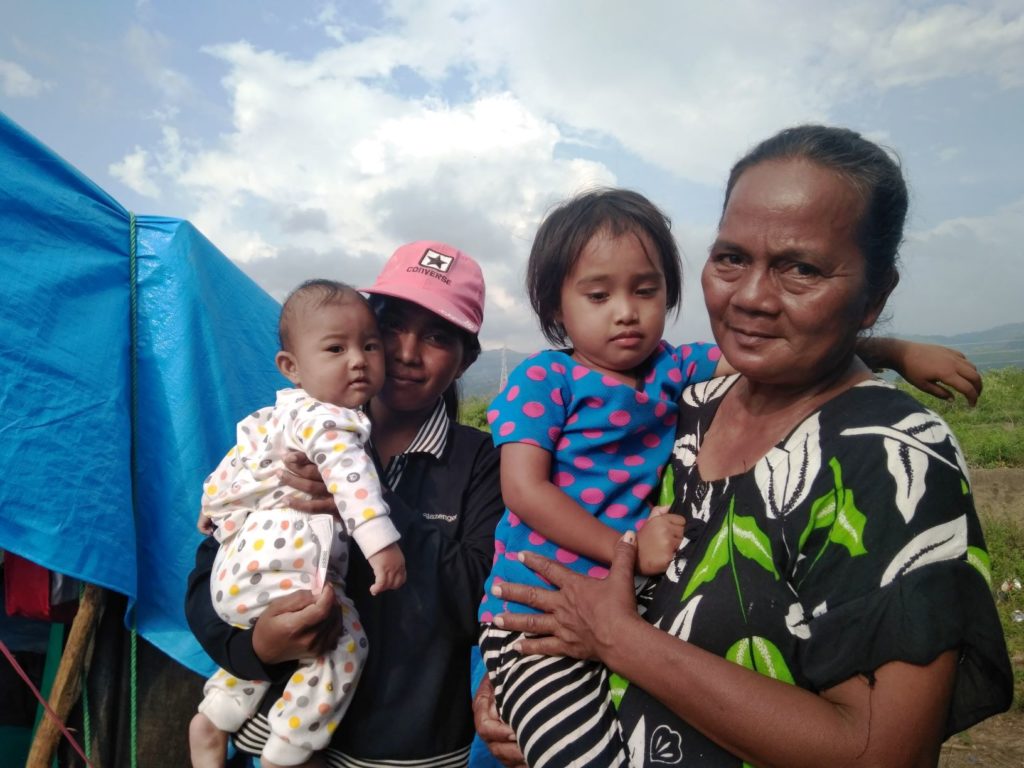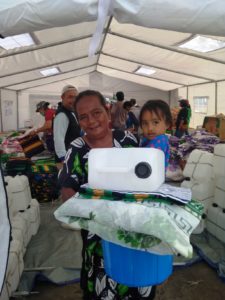Umi Sumbajono and her family had seconds to react when a 7.5 magnitude earthquake hit Indonesia’s Sulawesi island on September 28.
The 55-year-old grabbed her two grandchildren and fled from their home in Jono Ono village.

“I panicked and prayed,” Umi said. “We saw the land, the ground, splitting and cracking, with mud and water coming out of the ground.”
Over 2,000 were killed in the Indonesia earthquake and tsunami
Her home and neighborhood were among those destroyed by rivers of soil created by the earthquake, which also generated a tsunami in a disaster that killed at least 2,096 people and seriously injured over 10,000.
Please donate to our Indonesia Relief Appeal
Shops, homes, mosques and hotels collapsed and were swept away or suffered extensive damage. At least 67,000 houses were damaged or destroyed.
The torrents of muddy soil are now at a standstill and the tsunami waters have receded, but Umi and up to two million other survivors continue to suffer from the earthquake’s devastating effects.
Nowhere to call home
More than 87,000 people are living in evacuation centers or informal camps, with many more staying with relatives or friends.
Displaced families are scattered, making it hard to confirm their numbers and locations. In the most heavily affected coastal area, Caritas and local partners observed that up to 80 percent of houses were totally destroyed.
People in the area urgently need help with clean water, sanitation, hygiene, shelter and infrastructure repair. Many have lost everything.
Please donate to our Indonesia Relief Appeal
Caritas is providing emergency supplies

Umi received emergency supplies from Caritas. Photo by Maria Josephine Wijiastuti/Catholic Relief Services
Umi and her family, who left home without a single possession and spent their first night after the earthquake sleeping without any cover, are now living in tents, surviving with the help of emergency supplies from Caritas.
Caritas has procured essential food and household items for 6,000 families, as well as 9,900 tarpaulins, and distributions are ongoing. It has already handed out 2,000 household-and-hygiene kits to affected families.
Umi’s family is one of the recipients of Caritas’ household kits and help with water supply.
“We are thankful for so many kind people helping and caring for us,” Umi said. “Some people have helped us build water tanks and provided clean water. It’s very important to us. My granddaughter also received baby food and kits.”
Getting help to people in the most inaccessible areas
Caritas is expanding its relief programme, continuing to provide emergency relief to people like Umi, while extending its support to the most inaccessible areas and most vulnerable people.
Local staff members are among the most seasoned in responding to crises, given the cyclical nature of disasters in their country, and are working tirelessly to get aid to those most in need. Caritas hopes to assist 191,000 people in the next 3 months.
Donate so that we can reach those who need help
For the first phase of the response, Caritas has identified nine priority areas across the districts of Palu, Sigi and Donggala.
10,000 families still need help
Caritas aims to provide immediate relief to over 10,000 families through direct distribution of supplies or, in areas where markets are functioning, through cash assistance allowing people the flexibility to purchase items of greatest need for their families.
Caritas will also assess the availability of corrugated iron sheets for roofing in Palu and Makassar, and if communities need tools to support their clean-up efforts.
Providing clean water
The rehabilitation and cleaning of wells have been identified as priorities for improving access to drinking and washing water. To facilitate access to water, Caritas and its partners are procuring water tanks.
In some villages, the public water system exists, but the piping channel was smashed and needs repair.
Caritas is mapping out a long-term emergency relief and recovery strategy with its team and will work closely and meaningfully to involve communities for their safety, dignity and recovery in the months to come.
Major issues regarding land tenure are expected to surface. Those affected by liquefaction, where the earthquake liquified muddy soil and shifted buildings significant distances from their original locations, will have difficulty locating their boundaries.
Hundreds of families displaced and settled in temporary locations do not have guarantees against eviction.
“Thank you for helping us”
Umi is grateful that her family is safe and together, but she doesn’t know how long her family will continue living in tents.
“I’m thankful we survived,” she said. “But I don’t know what fate will bring us. I don’t know how long we will stay here in tents, but we’re together with other neighbors. Thank you for helping us.”
